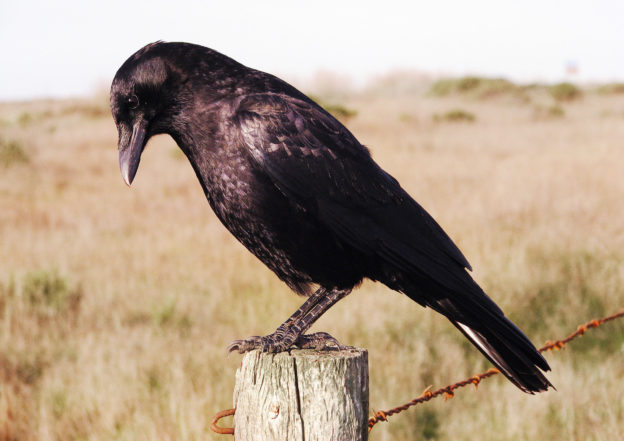This week’s Factslap edition comes inspired by an amazing documentary I caught on my favorite bird (besides Larry), crows:
1. They can solve puzzles: For a study, researchers once assigned a crow a simple puzzle involving eight tasks—picking up objects, moving them, and other complex steps. The crow had never seen them in sequence before. Yet, the crow finished it easily—the first bird to ever accomplish anything like it.

2. Crows can use tools: That earlier study also revealed that crows are capable of using tools. To further test this, researchers at Oxford dropped a small bucket of crow food at the bottom of a long tube and gave a hungry crow a wire. The crow bent the wire to hook the bucket handle and retrieve it.

3. Crows have street smarts: Forget puzzles and tools—crows have real-world skills. The one here, for instance, dropped an unbreakable nut onto the road so a car would run it over. Then he was free to chomp on the edible interior.

4. Some crows can be pricks: Crows will sometimes play cruel pranks. A zookeeper once reported that one repeatedly mimicked the voice of the human who fed the nearby chickens. The chickens would get excited thinking dinner was coming, but that wasn’t the case. Chumps.

5. Crows aren’t limited to bird noises; they’re impressive mimics: Though they typically communicate with each other through squawks and knocking, ravens at the Tower of London have been heard telling tourists to “keep the path.”

6. Crows know how to have fun: Pranks and impressions aren’t the only ways crows have a good time. Videos have emerged from Russia showing crows using cup lids as sleds. Elsewhere, dogs and cats have been known to play games with crows. One time, cameras even caught a crow playing with a ball on ice.

7. A German researcher concluded that crows can recognize themselves in the mirror: This puts the impressive birds in elite company with humans, apes, dolphins, and elephants. But their recognition skills don’t stop there…

8. They can recognize human faces: Researchers at the University of Washington spent months with the birds and, in one test, marked crows like normal. Later, they returned in cavemen masks, attempted an approach, and the crows attacked them. Without the masks, though, the crows didn’t lift a beak.

9. Crows remember their enemies: That study also showed crows remembered their enemies and acted accordingly… with Alfred Hitchcock-style horror beatdowns. It turns out that crows of a feather not only flock together, but they discuss their enemies and then attack them in coordinated dive-bomb assaults.

10. They don’t put their memories to use for just death and destruction, though: Some people have witnessed crows giving gifts to humans they respect. One such occasion saw a murder of crows leaving a little girl these trinkets every time she fed them from her garden.
 Daily Mail
Daily Mail
11. They have big brains: Studies have illuminated how crows and crows have such killer memories. For starters, these birds have big ol’ hippocampi, the part of the brain responsible for memory. And for good reason…

12. They’re pretty highly evolved: Seed-eating birds like nutcrackers historically needed to remember where they buried seeds or they didn’t eat. It’s an evolutionary trait, which helped explain why another study revealed that crows raised in captivity didn’t have as many hippocampal neurons as wild crows.

13. Some jays have human-like memories: Evidence suggested scrub jays can have episodic memories, the human trait of remembering specific events and when they occurred. These jays remembered all the food they’d hidden, where they’d hidden it, and how long it could last there without spoiling.

14. They’re as smart as apes: Though crows may be smaller in stature, they have similar, if not greater, brain power to primates. Thanks to dense collections of neurons in their forebrains, these birds can carry out some complex, ape-like thinking.

15. Crows are all about family: Mama crows don’t push their young from the nest as soon as they can fly. Grown-up crows actually stick around for awhile and help raise and protect younger birds and newborns.

16. Crows will adopt: Cornell researchers witnessed something both heartbreaking and heartwarming: after an adult crow known simply as RV died of West Nile virus, his children were orphaned. Amazingly, his neighbor and crow friend adopted and cared for the baby crows.

17. They’ll return the favor: Surprisingly, adopted baby crows expressed gratitude for their adoptive crow dad and mom. When the parents birthed new baby crows, the adopted birds, true to crows’ nature, stuck around the nest to help care for them.

18. Crows will spread the love: When it comes to adoption, crows don’t let things like a difference in species cloud their parental instincts. Once, when an orphaned fledgling blue jay showed up to a crow’s nest, researchers witnessed the mother crow feeding him.

19. Studies showed crows can live to be old geezers: The oldest crow ever found in the wild lived for 17 years. Meanwhile, a crow in New York that had been cared for and watched over by humans lived for a whopping 59 years.

20. Crows respect their elders: A 12-year study of a jackdaw community showed older birds earned more respect and power among populations. But that power came with a risk: high-ranking birds lived shorter lives, implying the jackdaw hierarchy was competitive and cutthroat.

21. Observations showed Crows respect their dead, too: Crows prodded a fallen companion with their beaks before retrieving blades of grass and laying them beside the passed-on bird; others have witnessed services in crow and raven communities.


